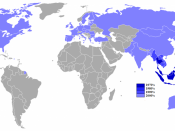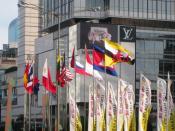Introduction and Overview:The Association of Southeast Asian Nations (ASEAN), undeniably, is often compared to the European Union (EU) in terms of the extent to which formal processes and binding agreements are exercised. Where the EU has used regulations and the force of law between members and Union, ASEAN has been cooperating through informal understanding that impose few legally binding obligations. As a matter of fact, ASEAN was formed only through a declaration, with neither a charter nor covenant nor treaty to be signed into by member countries which impose legal constraints.
This norm of unwritten and informal understanding has commonly come to be termed as the 'ASEAN Way', and it comprises a strong adherence to the following six principles:â¢respect for sovereignty and independence;â¢the non-interference in internal affairs;â¢non-recourse to the use of force;â¢the avoidance and non-confrontation of bilateral issues at the regional level;â¢consultative and consensual decision-making, andâ¢the use of discretion in dealing with matters of sensitivityTaken together, the above conceptualisations of the 'ASEAN Way' suggest that this normative framework is of significance in three very specific processes of intramural relations.
First, it is as an intramural approach to conflict and dispute management and confidence building; second, as a distinct decision-making practice; and third, as a clear process of identity formation relying upon modern principles of inter-state relations coupled with traditional and culture-specific conduct. In the rest of this paper, I wish to examine the principles enshrined within the 'ASEAN Way' in the carrying out of ASEAN's role with respect to the above three processes in greater detail. Each of the said processes involve the observance of a few of the principles of the 'ASEAN Way', with some principles crossed between processes.
Dispute and Conflict Management and Confidence BuildingCentral to the process of dispute and conflict management and confidence-building are the...


